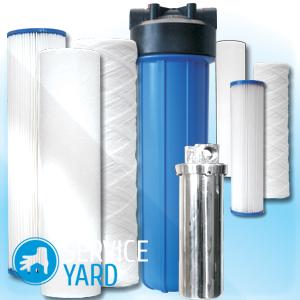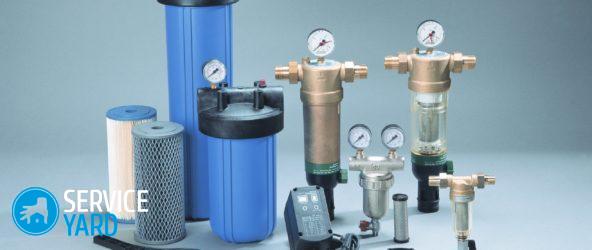Mechanical water purification filter

Ponds from which water flows into houses and apartments are rarely clean. Discharges from industrial enterprises, flushing from fields, roads and summer cottages - this is not all that affects the quality of water in the water supply. The pipes themselves are sometimes in such a state that they have to filter or boil the water, or even do both. Why do we need a filter for mechanical water purification, what kind of filters are there, how to use them? All this will be discussed in the article.
to contents ↑Before you get into the apartment
Water almost never comes directly from a river or lake. First, it enters the water intake, where it passes through several stages of purification mechanically and chemically. During filtration, particles of solids are removed - stones, sand, various objects. The more filters that can trap small particles, the better.
Important! The principle of operation of mechanical cleaning systems is based on the fact that water passes through special filters. In the process, it is filtered, and large particles remain on the filters.
What will happen if these particles are not removed? They will enter the human body, which will not bring any benefit, but can deliver a lot of trouble. In addition, pollutants tend to be deposited on the inner surface of the faucet, as well as on the walls of teapots and pans, due to which scale appears. Even worse, if sand or clay gets into the washing machine. Because of this, you can lose both the laundry and the unit itself.
In addition to sand and small pebbles, that is, mineral pollutants, are removed during mechanical filtration:
- organic impurities;
- petroleum products.
Degree of purification
At industrial enterprises, water intakes and sewage treatment plants, mechanical filtration occurs in several main stages:
- rough cleaning;
- upholding;
- separation of fractions;
- fine cleaning.
Rough cleaning
During rough cleaning, large contaminants are removed whose density is less than the density of water. Then the water settles, so that particles whose density is greater than its density settle to the bottom, and oils and petroleum products form a separate layer.
After that, the water is sent to a centrifuge or hydrocyclone, where the fractions are separated, the pollutants are concentrated in special containers. Then it is subjected to fine cleaning. As filter materials are used:
- cotton fabric;
- gravel;
- sand;
- coal.
Important! During chemical cleaning, the water is disinfected. For this purpose, chlorine is most often used. But it itself is by no means safe, since it has the ability to react with various organic substances, resulting in the result of organochlorine. Epidemiological services control the number of such compounds.
But even an ideally constructed cleaning system at the intake is not a guarantee that what flows from the tap can be drunk. Therefore, a mechanical cleaning filter in a modern apartment is simply necessary.
Fine cleaning systems
On sale you can find a mechanical filter designed for:
- apartments;
- office;
- cottage;
- enterprises.
The purpose is usually indicated on the certificate, as well as on the price tag. But there is no fundamental difference between the filters for different institutions.In any case, the device you need belongs to one of two groups:
- with replaceable elements;
- with non-replaceable elements;
- hybrid option.
Cartridge filters
Cleaning systems with interchangeable elements are called cartridge systems. Their action is based on the fact that the cartridge retains various impurities. The degree of filtration can be different:
- There are cartridges that filter out only large particles (0.1 mm or slightly smaller).
- For better cleaning, filters are used that collect pollutants with a size of not more than 0.005 mm.
Important! When there are too many pollutants on the filter and it stops passing water, it is removed and thrown away. Cartridge water purifiers are cheaper than those with non-removable elements. But their operation is more expensive, because you have to buy new filters.
Components
If you take apart the household water treatment system, you can see the following parts:
- housing;
- cover;
- brackets;
- the filter itself;
- clamping nuts;
- gaskets;
- device to relieve pressure;
- keys for the case.
How to change a cartridge?
Any owner can easily cope with this, it will take very little time:
- Turn off the water in the apartment.
- Remove the filter.
- Put a new one.
- Supply water.
Water purifiers
The second group includes flushing systems. A mechanical water filter of this type has a steel mesh or discs that hold back what should not be in drinking water. The “dirt trap” is periodically washed.
Important! The main disadvantage of the washing filter is that the device retains larger contaminants than the cartridge filter. Grids capable of filtering particles less than 0.02 mm in nature do not yet exist.
What are the wash filters?
You should not think that all water purification systems with fixed elements are the same. In stores, you can find several types of washing filters:
- mesh;
- backwash (also mesh);
- disk.
- Mesh - resembles a cartridge in its structure. To wash it, it is not necessary to disassemble it - just open the tap located below, which allows a stream of water to flush pollutants into a special drainage groove, and then into the sewer.
- Cleaning the backwash filter is a little wrong, although in this case it is enough to open the tap. Water begins to move in the opposite direction and washes away what has accumulated in the grid.
- In disk systems, as the name implies, the filtering elements are not grids, but interconnected disks with grooves of different sizes. All dirt remains in the grooves.
Which system to prefer depends on several reasons. Before you buy and put in a mechanical filter for water purification, decide what is more important for you - then you don’t have to think about new cartridges, or finer cleaning. In addition, you sometimes need to wash the mesh or disk mechanism:
- using a special mechanism (there are a lot of them);
- manually.
to contents ↑Important! In any case, the grid sometimes needs to be changed if there are a lot of organic pollutants and large mineral particles in the water.
Hybrid option
The hybrid combines the advantages of both filtration systems. It has nets that trap particles of almost the same size as high-quality cartridges. But these nets are cheaper, and they work for quite a while. Why is this possible?
Such systems use the same principle as industrial cleaning. They, like centrifuges, use the centrifugal force of moving water, as a result, pollutants fall into special containers and do not fall into the grid.
to contents ↑Which wash filter is better?
The buyer, purchasing a filter for mechanical treatment of water, focuses on several points:
- quality of cleaning;
- installation features;
- features of care;
- state of your own wallet.
Quality
As for the quality of cleaning, it is very important to understand where exactly the water comes from in your home, whether it is cleaned before that or comes directly from the reservoir (for example, in some private houses):
- For a city apartment in a modern neighborhood, the simplest mesh filter is usually enough.
- But in a private house a hybrid option would be better, plus a rough cleaning system at the entrance.
Mounting
Installing a filter is not a very complicated procedure, but it is better if it is performed by a specialist from a certified utility service - he will turn off the water and do everything correctly.
Service
Grids and disk systems must be cleaned periodically, or even changed. Direct flushing nets are easier to maintain - even a person whose technical knowledge tends to zero will cope with this.
Cost
As for the price, it is best to focus on the combination of "price-quality". Simple mesh washer filters are certainly cheaper, but hybrid ones provide better cleaning.
to contents ↑A few words about rough cleaning
Coarse filters are similar to those designed for fine, and operate on the same principle. The difference is where the water purifiers stand:
- Coarse filters are installed at the beginning of the cleaning system.
- Devices for thin - at the last stage, just before the water gets to the consumer.
These water purifiers collect the largest particles. They are divided into the following types:
- mesh;
- mesh with backwash;
- sumps (i.e. filters without rinsing);
- cartridge;
- pressure high-speed.
Important! Mesh, with backwash, cartridge care in the same way as their counterparts designed for fine cleaning. As for high-speed pressure devices, it is something like a hybrid - filled with different filter elements.
In urban apartments, hybrid systems are usually not installed, but in large private houses they are used not so rarely. These filters have quite serious drawbacks:
- large dimensions;
- compulsory drainage;
- the room where they are standing must be heated.
to contents ↑Important! The system for rough cleaning can be installed where water pipes enter the apartment building, or on the branch of the water supply to the cottage village. But this procedure must be coordinated with utilities.
Stock footage
After reviewing the information in this article, you probably were able to determine for yourself which filter of mechanical water purification is best for your home. Use the capabilities of modern technology to protect yourself from the harmful effects of the environment on your health.
- How to choose a vacuum cleaner taking into account the characteristics of the house and coatings?
- What to look for when choosing a water delivery
- How to quickly create comfort at home - tips for housewives
- How to choose the perfect TV - useful tips
- What to look for when choosing blinds
- What should be running shoes?
- What useful things can you buy in a hardware store
- Iphone 11 pro max review
- Than iPhone is better than Android smartphones




